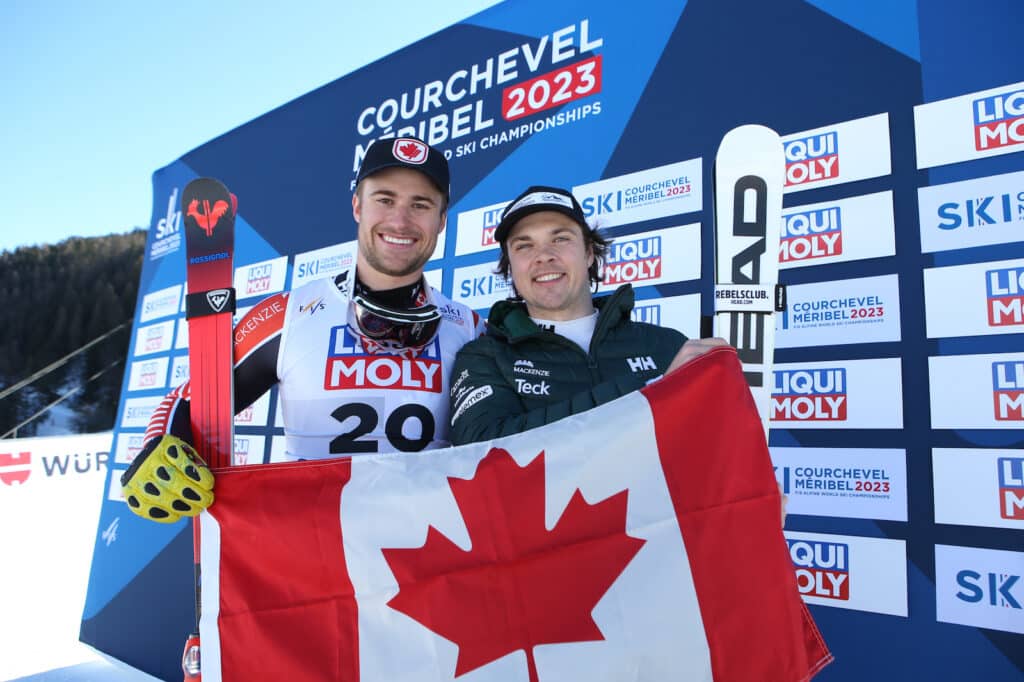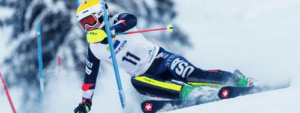Canada’s Rising World Cup Speed Team

[ad_1]
Peter Lange
Photo Credit: Malcolm Carmichael / Alpine Canada Alpin
The young Canadian men’s World Cup speed team is a thriving success story. Over the past decade, the program has made good progress. A talented group of skiers joined the Canadian Alpine Ski Team (CAST) while dedicated parents provided guidance and helped source funding. Hiring World Downhill Champion John Kucera and his right-hand Chris Powers as the group’s coaches undoubtedly fueled the progress.
Their 26-year-old leader, James Crawford, recently enjoyed remarkable success, winning the super-G at the 2023 World Championships and securing three 22/23 World Cup podiums. Moreover, his 26-year-old teammate, Cameron Alexander, who won his first World Cup in 2022, earned bronze in the 2023 World Championship downhill. The team’s achievements have inspired the entire ski racing community.

Among the super-G’s top 60 World Cup Start List (WCSL), the six Canadian men average 26.5 years. The Top 30 men average 31.3. Despite youth and limited funding, Canadians occupy 10% of super-G top 60 WCSL, with five ranking top 60 WCSL downhill. Four team members qualified for the World Cup finals, with James Crawford achieving a finals invitation in both super-G and downhill.
Five of the Six have Whistler Mountain Ski Club roots
The program’s origins are equally fascinating. Five of the six athletes come from the Whistler Mountain Ski Club (WMSC). Jeffrey Read’s story is unique, having developed through the Banff Alpine Racers. The stars aligned when John Kucera’s retirement from racing coincided with the first arrivals of this talented group of WMSC athletes at the Canadian Alpine Ski Team.
The only WMSC member in the group who is not from British Columbia is James “Jack” Crawford. The Toronto native joined the WMSC at 14. He arrived in British Columbia in mid-December and returned to Toronto in mid-April. His days in Whistler were focused on free skiing. His father, Angus, reports during Jack’s first years in Whistler, he would average over 100 days a season free skiing. When Jack began 10th grade, he moved to Whistler full-time and attended high school.
Referring to the WMSC athletes and Read, Crawford’s dad comments, “They are all competitive with a good attitude, and I know from conversations with Jack that if he can do it, so can they. They believe. A teammate doing well is uplifting and brings confidence to the entire group. They all work hard, ski well and, never quit, strive to be fast and technically sound. They are strong. And from this parent’s point of view, they all have a very good head on their shoulders, excellent work ethic and an impressive support network.”
Regarding the success of the Whistler men on the speed team, Crawford gives considerable credit to three-time World Cup winner and long-time Whistler resident Rob Boyd. Crawford states, “Rob Boyd had an instrumental role in shaping all the current national team athletes and many others.”
Enhanced ACA commitment
Also, in the spring of 2015, committed parents collaborated with Alpine Canada Alpin (ACA) Director Martin Rufener and CEO Mark Rubinstein to enhance the development teams.
After one year as the assistant to Kip Harrington, the ACA placed the men’s team under Kucera’s direction and targeted a specific group of athletes born in 1997 and a 1995 and a 1994 athlete returning from injury. The group focused on a blend of NorAm and Europa Cup racing, including training and competing at Lake Louise.
Kucera recalls their focus from the beginning: “Culture and environment are essential drivers for us. In some ways, the guys made it easy. They’re a tight-knit group. We didn’t have any drama or weird things to deal with. But we could establish the kind of culture and environment we wanted. We immediately started promoting the character traits that are key to success. Concerning skiing, we focus on building from a solid technical place. We have always put a premium on GS. It is the core discipline and the team puts a lot of effort into it.
To make the program possible, the parents help to source additional funding. Initially raising $100,000 to support both the men’s and women’s programs, the support increased to $450,000 in the second year and has since exceeded $1.2 million in total. Corporations and individuals provide valuable funding—however, the program requires each athlete’s mandatory fundraising commitments (team fee) to function optimally. The team fees have recently been reduced from $30,000 to $20,000. Fortunately, these elite athletes receive funding from Sport Canada for living expenses that, if needed, can help pay their CAST obligations.
Patience provides growing success
Since the enhanced program began, the group has continuously gained momentum, first achieving World Cup Quota through the NorAm Cup and Junior World medals. But they now earn podiums in the Olympic Games, World Championships, and World Cup events.
Unfortunately, CAST lost a primary tool to develop talented racers. Lake Louise World Cups and NorAms introduced many of North America’s best to elite-level speed events. Canada’s hosting of NorAm speed events coincided with future North American World Cup podiums. Lake Louise has also been the site of the most men and women North American-earned World Cup podiums. Twenty different North Americans have earned 55 World Cup podiums in Lake Louise. Among them, half also earned Lake Louise NorAm podiums. To quote a Canadian insider, “The ACA can’t afford the Lake Louise races, but from a development standpoint, they can’t afford not to host them.” Unfortunately, they have not identified a replacement
The Canadian World Cup team magic
Insiders also point to coaching leadership and cohort building as crucial to the team’s success. Additionally, they point to long-term thinking and patience as vital to their progress. Continuing this wave of success requires additional resources but, more importantly, the team’s camaraderie and competitiveness. It will also need good luck to stay healthy.
Ken Read is one of Canada’s three Kitzbühel’s Hahnenkamm downhill winners and the father of two World Cup athletes. He is impressed with the program the ACA has provided to his sons.
He shared his thoughts on the best speed teams. “The National Ski Federations, with robust development pathways, can blend experienced and developing athletes. It is an enormous advantage – but it is achieved only by intelligent athlete management. Building a team without elite leaders is possible, but it is much more challenging and takes longer. Giving the developing athlete access to the highest levels can also be difficult. When a team has a thriving group leading in the World Cup, it is extremely tough for younger athletes to break through. The correct answer to this problem is patience. Give them time, and don’t give up on them too soon (a favorite North American pastime).”
Everyone contributes
Every program member’s contribution created the team’s success. When they were young, their programs let the mountain do much of the teaching, instilling confidence. The strong leadership and family support undoubtedly contributed to their best achievements.
The rise of the young Canadian Men’s World Cup speed team is a remarkable example of determination and talent. Through dedication, support, and the guidance of seasoned champions turned coaches, they have defied the odds and achieved extraordinary results. With podium finishes in prestigious competitions and a strong sense of camaraderie, their achievements have inspired the entire ski racing community. The program’s origins, rooted in a unique blend of athletes, further add to the compelling narrative.
Canadian World Cup team future
Kucera comments on the goals and potential of the group: “I feel like we’re at the beginning of this journey. This team is only entering what we would consider the peak ages for male speed racers. We know; we work with them every day. There’s still a lot more room for growth. Our job is to instill the belief that we can succeed in every race at the highest level. Ultimately, I’d like us to be more than just contenders. They are capable of walking away with Olympic medals and targeting globes. Targeting globes sets the truly elite programs apart from the good programs.”
As they continue their journey, the team’s success is a testament to the power of perseverance, coaching leadership, and unwavering belief in each member’s potential. With proper resources and a resilient spirit, they are poised to make an even more significant impact on the international stage, leaving a lasting legacy for Canadian alpine skiing.
Angus Crawford concludes, “They are quite good friends and their friendships will carry on well past their skiing careers, wherever they end up.”
Click on images to enlarge




[ad_2]
Source link







